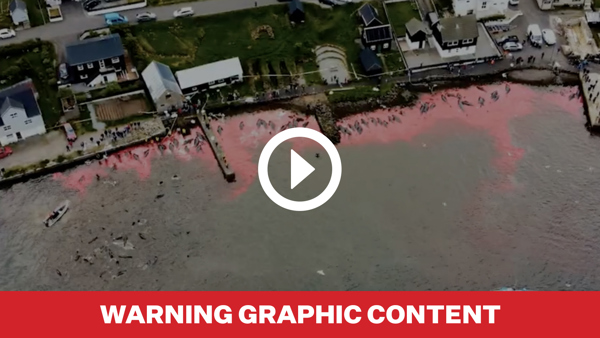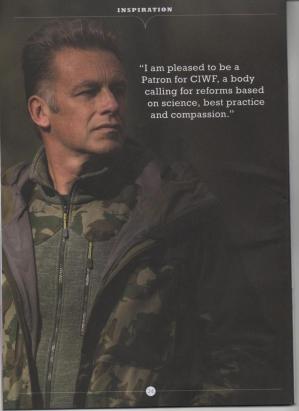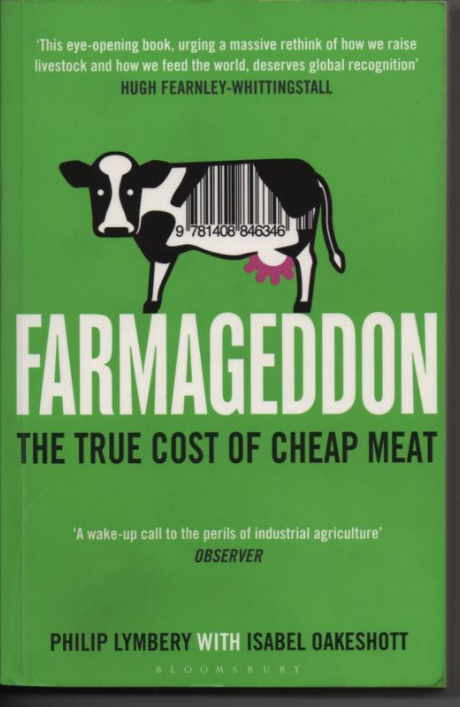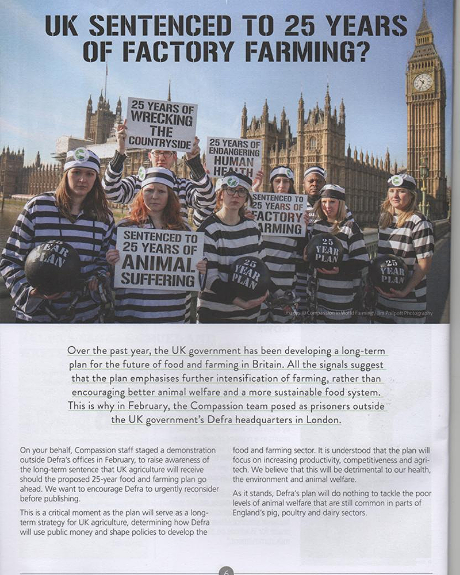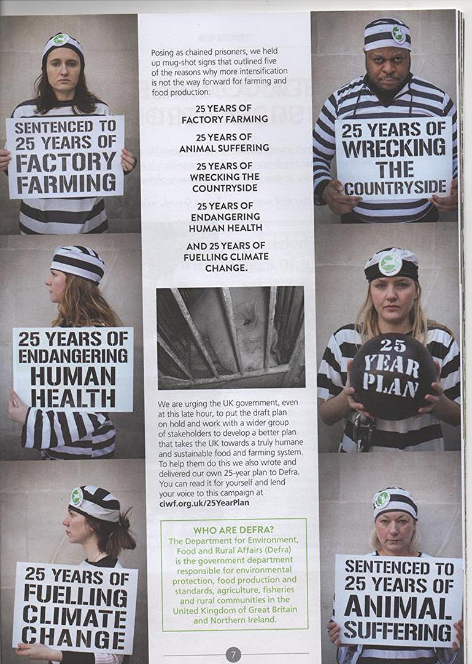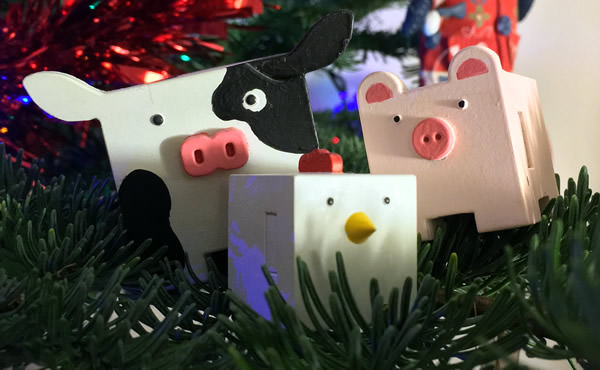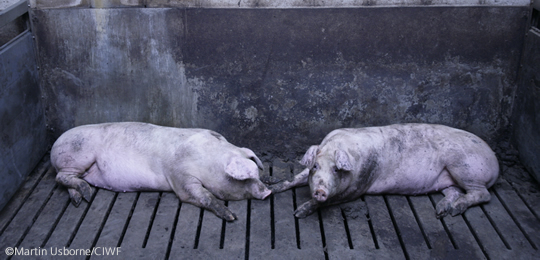Welcome to the Rudloe and environs website.
Here you will find news, articles and photos of an area that straddles the Cotswold Area of Outstanding Natural Beauty in north-west Wiltshire.
Contributions in the form of articles or photos are welcome. Even those with completely contrary views to mine!
Thanks to the website builder 1&1 and Rob Brown for the original idea.
Rudloescene now, in January 2014, has a sister, academic rather than anarchic, website about Box history here: http://www.boxpeopleandplaces.co.uk/
It contains thoroughly professional, well-researched articles about Box and its people.
Contact rudloescene through the 'Contact' page.
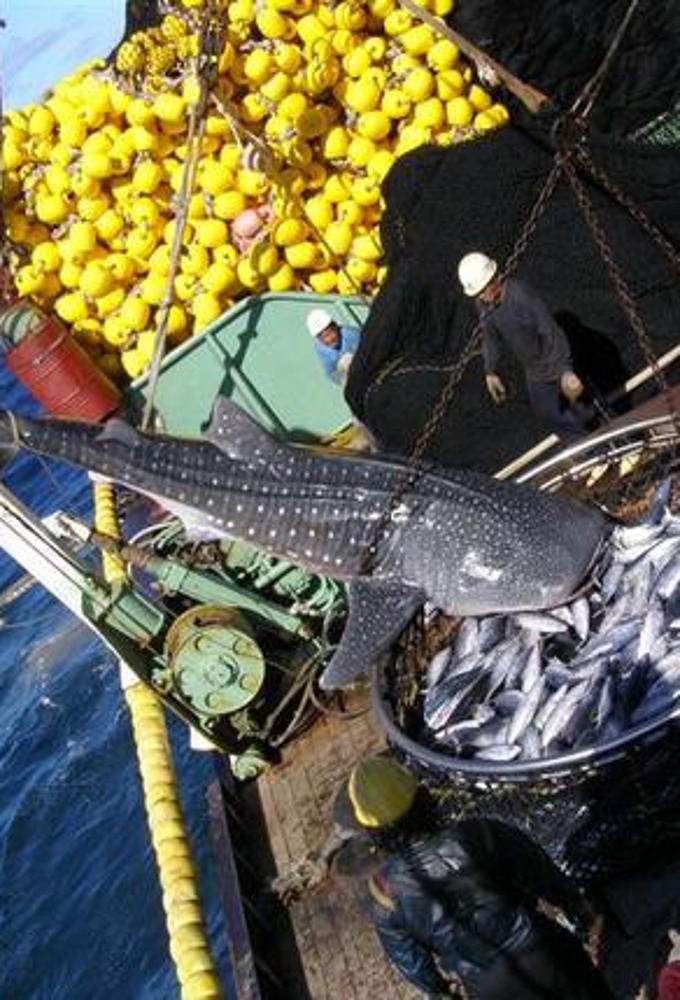
An image from Greenpeace showing what destructive tuna fishing is doing to our ocean life - see the 9th October 2015 article below
13th July 2024 - I may have been guilty of crying wolf in years gone by regarding the dearth of flying insects (can you recall the state of the cars headlights following a summer's day trip to the seaside) but the moths I was concerned about last year eventually appeared. However, this year there is a significantly worrying concern. In past years, bees could always be seen on the wild flowers (clover, dandelion, selfheal, oregano) we allow to grow in our lawns, front and back. This year, we are not seeing any bees - very worrying.
12th June 2024 - whaling in Faroe Islands and Iceland waters. The following 'article' (email) from the Sea Shepherd organisation recounts the whaling taking place in the Faroe Islands. And today, an article in The Times reports that, after a one-year break, the Iceland government has approved the killing of c.100 fin whales in the current season (which lasts until September). Skithaelar (Icelandic for bastards; Danish for bastards is, apparently, ... bastards).
|
|||||
|
|||||
|
|||||
|
9th June 2023 - I have saved myself £100 but am not too pleased about it (see the 24th July 2021 article below). In April this year, KAALE sent the following email:
However, as I predicted, the Tories found an excuse to drop the Bill - a Conservative 2019 manifesto commitment to end the export of live animals for fattening and slaughter. The Bill was withdrawn yesterday, 8th June 2023. You cannot trust the Tories.
24th July 2021 - an unexpected consequence of the Brexit referendum has been the discontinuation of the export of live animals. Apparently, the paperwork required for the importation of live animals to the EU from non-EU countries is tortuous and the farmers/exporters do not have the wherewithal to undertake this process. A charitable organisation by the name of Kent Action Against Live Exports (KAALE) supported Brexit as the Government had promised that this situation would be made permanent through a proposed bill. That bill is passing through Parliament at the moment. I have a substantial bet with KAALE that the Government will bow to pressure from farmers and landowners and that live exports will be allowed to continue (assuming that the paperwork issue can be sorted). We will see what happens. KAALE's latest proclamation (email) on this subject is reproduced below. The issue is particularly pertinent at this time as the Muslim 'slaughter festival' or 'horrific festival' (known as Eid or Eid Al Adha) is currently underway.
Email from KAALE - 20th July 2021
28th September 2020 and this week brings a world leaders' Pledge for Nature to put wildlife and climate at the heart of environmental recovery plans. World leaders have pledged to clamp down on pollution, embrace sustainable economic systems and eliminate the dumping of plastic waste in oceans by the middle of the century as part of “meaningful action” to halt the destruction of nature on Earth.
Emmanuel Macron, Angela Merkel, Justin Trudeau, Jacinda Ardern and Boris Johnson are among 64 leaders from five continents warning that humanity is in a state of planetary emergency due to the climate crisis and the rampant destruction of life-sustaining ecosystems. To restore the balance with nature, governments and the European Union have made a 10-point pledge to counteract the damage to systems that underpin human health and wellbeing.
All signatories to the Leaders’ Pledge for Nature, launched virtually in New York on Monday, have committed to putting wildlife and the climate at the heart of post-pandemic economic recovery plans, promising to address the climate crisis, deforestation, ecosystem degradation and pollution.
The Pledge was highlighted in an article on Radio 4's 'World at One' programme today (28th September) which featured a British attempt at rewilding in Suffolk. Three farmers are aiming to rewild an area the size of Dorset (that's what it said!) and are calling on everyone to pledge 20% of their land to wildlife. Farmer Hugh Somerleyton said "A lot of people feel helpless in the climate change battle. Here (looking at a wilded hedgerow) we have a traditional hedge but we have allowed it to grow wild out into the field to produce a riot of overgrown hawthorn, bramble, trees, tussocky grass and even a few late flowers. For the domestic garden, it doesn't mean completely letting it go to abandonment but what we're trying to do, culturally, is move away from this obsessive 'tidy up' gene which we're particularly good at in Britain whether it be in our gardens or, as here, on our farms".
The photograph below (see the text further below) illustrates the issue at local level - hedgerows destroyed unnecessarily in the desire for neatness.
Such unnecessary tidying up has been highlighted on many articles on rudloescene; a few examples follow:
- the final photograph in this article: https://www.rudloescene.co.uk/localities/rudloe/midsummer-2017/ last photo
- the photo and text about midway through this webpage: https://www.rudloescene.co.uk/litter-2020/august-2020/ (see photo above) mid-way through August 2020 photo
- the last photo here: https://www.rudloescene.co.uk/localities/here-and-there/walks-in-the-time-of-covid-k/ last photo
The 'traditional' (since 1970) CPRE best kept village competition, one of whose criteria is tidiness (aaaargh), should perhaps be replaced by a wildest village competition.
14th June 2019 saw the great and the good at the Reformers' Tree in Hyde Park for a rally in support of Compassion in World Farming's (CIWF) Stop Live Transport - International Awareness Day rally. Speakers included Phil Lymbery (CIWF CEO), Peter Egan (actor) and Theresa Villiers MP.
The horror of live animal transport is encapsulated in the following story of the ship Cormo Express which set sail from Australia to Saudi Arabia in August 2003 carrying 57,000 sheep ...
- Dutch owned ship MV Cormo Express departed Fremantle, Western Australia on August 5, 2003 loaded with 57,000 sheep destined for the port of Jeddah in the Red Sea, Saudi Arabia .
- After a voyage of approximately16 days, arriving around August 22, Saudi Government veterinarians rejected the shipment, maintaining that the level of the disease 'scabby mouth' was higher than 5%. A bilateral agreement with Saudi Arabia allows only 5% of sheep in any shipment to be infected with scabby mouth, an infection that causes lesions in the sheep's mouth. It can infect human handlers of infected sheep.
- There is no air flow due to the ship being 'closed sided'. Questions arise as to whether the desalinisation plant for drinking water, the ventilation and extraction plants that provide fresh air and the extraction of foul, air are in fact working.
- On August 23-24th the Cormo Express visited Aqaba port in Jordan and was advised that because the ship had already called into another country, Jordan would not accept the sheep or allow the sheep to be off-loaded.
- The Cormo Express was again anchored in Jeddah Harbour, 28 August, whilst high level talks were held between an Australian delegation and the Saudi Authorities. Permission was again refused on the basis of the scabby mouth. The Saudis refused to amend their assessment of the number of sheep infected. The ship loaded fodder to last two weeks and left Jeddah.
- Rejection again by United Arab Emirates in early September, but permission was granted to load fodder and left UAE 11th September 2003. The ship spent some time sailing the north of the Arabian Sea to seek better weather conditions.
- Cormo Express and the remaining (approx) 53,000 sheep are still aboard without a secure future. No country willing to take the animals.
- The ship and the living cargo are still in an unknown Middle East port, in the UAE loading fodder (pellets).
- The sheep are at a greater risk of heat stress as this fully enclosed ship's ventilation system requires movement to operate at its peak. At present: temp 36 degrees, humidity 89% with no wind.
- The talks between Pakistan and Australia have apparently not resulted in the sheep being accepted.
- To date: at least 6.3% of the sheep or 3951 have died (confirmed by industry sources several days ago).
- About this date 142 sheep died during the stopover.
- An industry-appointed Australian veterinarian and an Australian Livestock Officer (nominated by Livecorp) and 54 crew are on board.
- Pakistan has turned down the offer as of 23 September 2003 .
- Warren Truss states negations are still continuing with other countries and not all were in the Middle East .
- September 23rd is the 49th day the animals have been on the ship since loading on August 5th .
- Fears are rising that the ship will soon run out of fodder for the 50,000 odd sheep still aboard after United Arab Emirates refused permission for the ship to berth in the port to reload.
- Late September Australian Government purchases the sheep on behalf of the live export industry for A$4.5 million.
- Cormo Express arrives near the port of Basra in Iraq 27/28th September. The shipment is declined by the UK and US army commanders siting concerns over resources required to care for the animals and distribution problems.
- An increase of heat and humidity in the port sees the ship leaving the port in an effort to reduce the stress on the sheep.
- Announcements by Warren Truss stating that the "co-regulatory system" whereby control is shared between the industry's own body, the LiveCorp, the Australian Quarantine and Inspection Service and the Australian Maritime Safety Authority would be abandoned.
- Warren Truss, Federal Minister of Agriculture announces, September 30th, the sheep may be bought back to Australia .
- A small taskforce including Gardiner Murray, Australia's Chief Veterinary Officer, travel to the Middle East to help in negotiations and assess discharge, stockyard and slaughter facilities at any Middle East port that may accept the sheep.
- October 2; WORLD FARM ANIMALS DAY Demonstrations and protests are held around the world (Australia, Korea, and Europe) against the live animal trade and to show respect and concern for the sheep still on board the Cormo Express.
- October 4 WORLD ANIMALS DAY. Today sees a march through Perth City by animal lovers in dedication to all animals.
- Estimations are that at least 5000 sheep have died with approximately 50 more dying everyday due to heat stress.
- LiveCorp and the Australian Government are still to find a buyer.
- Ministers of Agriculture agreed on October 2nd to support the establishment of an independent review of the live export industry.
- October 6 Cormo Express due to leave Kuwait after reloading fodder and water supplies.
- Prime Minister John Howard has said that the sheep will probably return to Australia.
- No deal has yet been struck between Iraq, Afghanistan and Australia.
- Federal Govt has set October 7th as the deadline to decide if the sheep will return to Australia.
- Departure delayed by fire on the Cormo Express. As the ship is in a port in Kuwait loading fodder and supplies a fire breaks out which is thought to be caused by a build up of static electricity.
- October 9. PM rules out 'slaughter at sea' for the remaining 50,000 sheep aboard the Cormo Express. The ship is still in port in Kuwait.
- October 10. Mr Howard and Cabinet decide to bring the sheep back to Australia provided a buyer cannot be found prior to arriving in Australia.
- Machinery breakdown delays the departure for the second time. The ship still in a port in Kuwait will sit in sweltering heat with it's cargo of 50,000 live sheep.
- October 11 RSPCA set to boycott any new inquiry into the trade. Hugh Wirth, RSPCA national president, states that "If he (Agriculture Minister Warren Truss) thinks that we are going to waste out time and money by participating in another inquiry then the Government has another think coming."
- October 13. Departure delayed AGAIN as 50,000 or so unwanted sheep still on board the Cormo Express are forced to remain in temperatures reaching 40 deg because of loading problems.
- 14 October sees pressure rising for the Federal Government over plans to bring the sheep home.
- October 15. Cormo Express STILL in Kuwait. Expected to leave tomorrow. No real explanation given as to the delay except to say that low tides prohibit their departure!
- Indications are that negotiations are underway with African countries in a bid to off load the sheep and avoid bringing the animals' home.
- October 17. Death ship, the Cormo Express left Kuwait last night destined for Cocos Island. The sheep will undergo a "very very elaborate and careful quarantine inspection" Mr Howard said.
- October 18. The remaining sheep aboard the 'ship of death' Cormo Express is finally heading home. The trade minister was sent to the Middle East in an effort to find another market but has failed. Australia insists the animals are healthy. Farming interests fear they may have contracted diseases!
- Continual delays in the departure of the Cormo Express have resulted in the remaining sheep standing in their own excrement and urine for 74 days. There are no accurate figures as to how many sheep are still actually alive. A figure will not be available until the animals are offloaded and a full count is undertaken. The sheep pens have not been fully cleaned since leaving Fremantle August 5 2003 .
- 21 October. US Animal Rights advocates People for the Ethical Treatment of Animals held a protest outside the Australian Embassy in Washington DC. The protestors, one dressed in a sheep costume, held the noisy demonstration to highlight and condemn Australia 's treatment of sheep on the Cormo Express.
- October 24th. At 4.30 pm, off loading of the ill fated Cormo Express began. This process will take 3 days and the sheep will then be taken by road another 58 kilometers inland to feedlots near Asmara.
- Australia has paid Eritrea $1 million plus 3000 tonnes of fodder to take the sheep. This is above the already massive bill of $10 million cost to the Australian public.
- Official figures state well over 5000 sheep have died, however animal welfare sources place the real sheep deaths at far greater numbers. In fact, we are led to believe that hundreds if not thousands more have died and were disposed of at sea before the vessel was tied up at the port of Massawa, in Eritrea.
- The final fate of the Australian sheep who have been through hell, is yet unknown. Some believe the animals will be slaughtered and sold in Eritrea, others say that they will be transported farther on, to other countries. Whatever lays before them, it will not be pleasant. Death in these countries is by having your throat slit while fully conscious, no pre-stunning here. Our only hope is that the slaughterman use sharp knives to help the dying animals go as fast as possible.
So you may see why people gathered at rallies across the world, including our Hyde Park rally, to protest this appalling trade. My personal involvement with CIWF started on a freezing winter's night in the late 80s. I was waiting in my car to board a ferry at Calais and was wrapped up against the cold with heater on. Amongst the vehicles disembarking were two animal transporters loaded with sheep which would probably be making long journeys to southern Europe. But neither humans nor sheep were designed to make journeys, travelling at speeds of up to 60 mph, at sub-zero temperatures. So this was yet another aspect of this evil trade which isn't usually factored into the well-known horrors (transportation itself; overlong journeys; lack of food, water and rest stops; the eventual horrific denouement of ritual, possibly halal, live slaughter). Many of the animals involved at this time of year are very young, just weeks old and not yet weaned. These could be calves destined to spend their short lives in crates being fattened for their veal. Kent Action Against Live Exports (KAALE) campaigns vociferously against this trade; KAALE holds demonstrations at Ramsgate at every sailing of the export ship Joline and at Dover on the first Saturday of every month. Further photos from the Hyde Park rally follow ...
3rd June 2019 - the summer 2019 issue of Compassion in World Farming's (CIWF) magazine Farm Animal Voice announced that Chris Packham (on BBC TV this week and last with Michaela Strachan and others in Springwatch) has become a patron of the organisation.
A message from Chris in the magazine indicates that our diets need a critical rethink from the health perspective and from the point of view of animal welfare (see below *) to the impact that farming has on wildlife and to the way that our food choices shape the environment of the entire planet.
Chris continued "We had a healthy farmed environment for thousands of years. It was diverse, it actually generated a mosaic of habitats that weren't there before we farmed that environment. We farmed in sympathy and harmony with nature. Now it's all about dominating nature. It's about controlling it and generally controlling it without tolerance. It's about pesticides. It's about herbicides. But what we're doing is damaging that environment beyond the point that it will support our farming processes".
* With regard to animal welfare, an article in Farm Animal Voice discusses the use of CO2 in the slaughtering of pigs. The article states that around three quarters of British pigs are killed in this way. So take a look, if you can, at the video Pig slaughter with CO2 on Phil Lymbery's (Phil is the CEO of CIWF) website. The article and video are from 2018.
18th December 2018 - A Christmas Message
‘The economy is not growing’ or ‘the economy has not grown’ are familiar headlines following the publication of annual statistics. The implication is that we want the economy to grow; we want to open a third Heathrow runway to enable this growth; we need HS2 to, ostensibly, enable the North to grow. But we also, supposedly, want to protect the environment. Aren’t these two aims mutually exclusive? What do we really want – to grow or to protect the environment? In fact, it doesn’t matter what we want; we are all on a treadmill and cannot get off.
We now realise the problems associated with wonder materials such as plastics. Yet particularly at this time of year, hype, greed, commercialisation, marketing, advertising and so on see us flock to the shops and supermarkets in droves to purchase over-packaged goods that we don’t really need and which will become superseded, obsolete and discarded within a few years. All of these goods will contain plastics of some sort. Our self-serving offensive against plastic waste doesn’t stand a hope in hell of keeping up with mass consumption.
Just look around you the next time you go to the supermarket. Look at your trolley and the plastic in it whether light packaging or more substantial trays. Then look at the scores of people around you each with their own trolley load of stuff. Then think of all the other supermarkets in town where the same thing is happening (if in Melksham Sainsbury’s then trolley-loads will also be leaving Waitrose, ASDA, Lidl and ALDI). Then think of all the supermarkets across the country and across the world where millions of trolleys will be filled today and every day. Day after day after day, millions of tons of plastics will be departing supermarkets to, mainly, end up as plastic waste. The recycling industry doesn’t stand a cat in hell’s chance of keeping up with consumerism and ‘growth’.
Happy Christmas
31st October 2018 - the BBC stalwart Countryfile continues to court the farming lobby with its 'poor farmers' (a perennial fable) and 'farming heroes' (some well-founded stories) but the many farming villains rarely feature. Locally, a number of farmers have sold off good agricultural land for development (at £1 million per acre in southern England according to Farmers' Weekly (2016)). These farmers have denied the local community (and, indeed, themselves) good land and landscape whilst costing ratepayers many tens of thousands in fighting unnecessary planning applications and piling pressure on local resources. They take no part in the local debate on the issue whilst sitting back and waiting for their windfalls.
But enough of this aspect ... an organisation called Kent Action Against Live Exports (KAALE) has campaigned for many years against the issue indicated by its moniker. KAALE is strikingly active in its field of interest, sending out many emails, SMS texts etc to its supporters every week. It organises monthly demonstrations at the port of Dover against live exports as well as attending every sailing from Ramsgate of the export ship Joline. The YouTube video below shows 3 to 6-week-old calves at Ramsgate on transporters originating from a Scottish farm (or farms). But this has just been the beginning of their nightmare ... a sea crossing and a two-day journey to Spain follow. Then slaughter or confinement in a crate for many weeks (then slaughter).
So here we have more farming villains putting profit above welfare of animals. But wait a minute, are we, the unthinking consumers, the real villains? The dairy industry is replete with issues from animal husbandry and health to human health - for a summary of these issues, see Compassion in World Farming's webpage: CIWF - dairy cows.
If, by some miracle of science, you could be transported to a distant, inhabited planet where you found one species that kept other species caged up then transported to their eventual slaughter, what would you think of the subjugator species? I suspect that you would think that the species that exercised such dark power was evil.
Talking of evil, we come to halal slaughter. The video below, for which you will be required to login to YouTube (so you will need a YouTube account), was taken by a whistleblower in an 'accredited' halal slaughterhouse in Norfolk
It goes without saying that this practice is barbaric and should not be allowed in a supposedly civilised country. It has taken many hundreds of years for Western Christian countries to eliminate former, barbaric practices such as hanging, drawing and quartering or burning at the stake, yet we allow, by pandering to religious/cultural perversions, appalling treatment of animals in the 21st century.
8th October 2018 - a 2016 BirdLife International report has only just come to the attention of rudloescene. The second link in the news report below is well-worth following as it shows the scale of killing against a map of the relevant area of the Mediterranean. When HM and myself visited Cyprus some years ago, one of the environmental aspects which we noticed was the absence of birds - this report indicates why.
Scientists from BirdLife International estimate that 20 locations in the Mediterranean may be responsible for eight million individual birds being illegally killed or taken alive each year.
In the paper Preliminary assessment of the scope and scale of illegal killing and taking of birds in the Mediterranean published this week in the scientific journal Bird Conservation International, the authors present a detailed analysis of how many birds and of which species are impacted, where the 20 worst locations are and why different species are targeted in each country. The report was previewed in the BirdLife review The Killing, published in August 2015.
“We were shocked to discover that 25 million individuals of over 450 species are estimated to be illegally killed or taken alive in the Mediterranean region per year, mainly for food (to be eaten as a delicacy or sold for profit), sport and for use as cage birds or hunting decoys,” Dr Anne-Laure Brochet, lead author of the report, said. “Importantly, eight million birds are estimated to be killed or taken at just 20 locations. Given the uncertainty around these numbers because of the difficulty in documenting illegal activities, the total could be anywhere from five to 11 million.”
These 20 places are found in just four countries: Cyprus, Egypt, Lebanon and Syria. They include the Famagusta area of Cyprus, where 400,000-1 million individual birds are illegally killed or taken each year, and the El Manzala area of Egypt, where 30,000-1.1 million individuals birds are illegally killed or taken each year.
The highest estimates of birds illegally killed or taken in the Mediterranean region were for Italy (3-8 million birds), Egypt (300,000-11 million) and Syria (3-5 million), while the density of illegal killing/taking was highest in Malta (18-667 birds per year per sq km), Cyprus (146-351 birds per sq km) and Lebanon (161-335 birds per sq km).
“It was disturbing to find that despite the positive impact of EU legislation, half of the top 10 countries with the highest levels of illegal killing are Member States of the EU. This indicates the need for greater effort to ensure that the EU Birds Directive is fully implemented at national level,” said Willem Van den Bossche, co-author of the paper and Flyway Conservation Officer for Europe and Central Asia at BirdLife Europe.
The birds affected by illegal killing include the Blackcap (1.2-2.4 million individuals per year), European Turtle-dove (300,000-900,000 individuals per year) and Song Thrush (700,000-1.8 million individuals per year), among many others.
The data were collected by BirdLife Partner organisations across the region using a variety of sources, including targeted monitoring data, police records, publications, reports and expert opinion. In many cases, the numbers were extrapolated from data or estimates of the number of mist-nets, shooting incidences, recoveries in animal hospitals and rehabilitation centres, and illegal ‘limesticks’ used to trap birds with sticky glue
“Illegal killing is a complex conservation problem, with key methods of killing, targeted species and motivations varying between countries,” explained Dr Vicky Jones, co-author of the paper and Senior Flyways Officer at BirdLife International. “Addressing this issue requires action on a local, national and international scale, involving law enforcement agencies, the judiciary, hunting associations, national government authorities, non-governmental organisations and international policy instruments.”
National action plans to tackle illegal killing have recently been developed by a wide range of stakeholders in Egypt/Libya and Cyprus, with the aim of strengthening legislation and its enforcement, improving monitoring, and supporting efforts to take action for individual species.
“Unsustainable exploitation is one of the major threats to the world’s birds, and much of this is illegal. Our study is the first to compile detailed quantitative estimates of the scale of the problem in the Mediterranean. Our identification of the worst locations will help to focus efforts on the ground to tackle the issue,” said Dr Stuart Butchart, co-author of the paper and Head of Science at BirdLife International.
5th April 2016 - intensive pig unit approved by Wiltshire Council
Planning application15/11618/FUL for an intensive 2000-pig industrial factory unit at Cowage Farm in Malmesbury was, according to the local press, approved by the Northern Area Planning Committee at its meeting on 30th March
Two-thousand pigs to be intensively reared in a building of 1,855 sqm (see page from application 15/11618/FUL at left) - less than one square metre per pig!
'We' should not be doing this. Industrial-scale factory farming is one of the principal drivers of global warming. These pigs will, no doubt, be fed on cereal or grain, probably imported and which could be used to feed the world's poor and that is grown in areas of the world cleared of natural vegetation and habitat (certainly in the case of soya).
Among the representations made on this application, a local resident cites research on the subject of 'fertilizing with swine manure' (as proposed with this planning application): "According to Michael Schmitt and George Rehm (Extension Soil Fertility Specialists, University of Minnesota Extension Service, Department of Soil, Water, and Climate) in a report on Fertilizing Cropland with Swine Manure written in 2002 ‘Estimated daily manure output of a 90 kg pig is 5.9 kg.’ In a unit of 1900 pigs you are talking about 11,210 kg of manure per day. This will need to be stored for a year before it breaks down to usable manure. Therefore a muck heap for the year will be large enough to store 4,091,650 kg of manure. (approximately 4100 tons)".
Also, see the 18th December 2015 'A Christmas Wish' article below. And if you have the inclination, do buy the book FARMAGEDDON by Philip Lymbery and Isabel Oakeshott. I would wholeheartedly agree with the Guardian's analysis: 'Will convince anyone who doubts that industrial farming is causing ecological meltdown'.
Addendum to the 5th April 2016 article - the following text is taken from a 3rd October 2016 news article
Meat produced from British pigs has been shown to be infected with a livestock strain of MRSA, the Guardian can reveal, raising concerns that the UK is on the brink of another food scandal.
Tests on a sample of 97 UK-produced pork products from supermarkets show that three – sold at Asda and Sainsbury’s – were contaminated with the superbug strain which can cause serious health problems.
The Guardian, working with the Bureau of Investigative Journalism (BIJ), has also established that a loophole in import regulations is leaving an open door for MRSA CC398-infected live pigs from countries such as Denmark, where the disease is rife.
The findings have serious implications for human health. MRSA CC398 is a potentially deadly bacteria which can be resistant to even the strongest antibiotics. It is less harmful to humans than the MRSA bug that kills about 300 people in hospitals in England and Wales each year. But it causes unpleasant persistent infections and can seriously harm people with compromised immune systems, such as those already suffering other illness. It is known to have been responsible for at least six deaths in Denmark, though that is likely to be the tip of the iceberg. People can contract the disease from infected meat, and from infected animals. The superbug, like other foodborne germs, is killed by thorough cooking - but it can be passed on through lapses in hygiene. Workers on pig farms can also catch the disease from infected animals and pass it on to other people.
Without action to halt it, the spread of the bug could follow the pattern in Denmark, where MRSA CC398 became established over a decade, now afflicts about two-thirds of pig farms and is viewed as a major public health crisis, with 12,000 people believed to have contracted it. Currently, there is no screening programme for MRSA CC398 on British farms.
Prof Tim Lang, of the Centre for Food Policy at City University in London, said: “If we don’t have tight infection control and we don’t try to control the movement of live animals, infection can spread. The British are up in arms about the movement of people, but the EU also has a large movement of animals. We need biosecurity, we need to tighten up this livestock movement. You may get cheap meat, but in the long term it’s going to add to your public health problems.”
Prof Erik Millstone of Sussex University added that the emergence of antibiotic-resistant superbugs from agriculture was “a huge threat to human health” and that there was a clear risk that MRSA CC398 could spread among British livestock herds and to people. He anticipated that the government would downplay this risk but warned: “While the [government] tries its customary tactics of blaming the victim, it won’t work.”
The tests were carried out by Dr Mark Holmes, director of studies in clinical veterinary medicine at Churchill College, Cambridge University, and commissioned by the Alliance to Save Our Antibiotics, founded by the Soil Association, Compassion in World Farming and Sustain. Two samples of minced pork from Asda and one from Sainsbury’s were found positive.
Last year, tests by the Guardian on 100 samples of pork in UK supermarkets, including a mix of imported and UK-bred meat, found nine contained the superbug. However, all but one of the infected products were of Danish origin, the other Irish. That investigation marked the first time MRSA CC398 had been publicly found in products in UK supermarkets.
Today’s follow-up tests are the first to name supermarkets whose UK-produced pork has been contaminated with the superbug. It is not possible to say whether these products originally came from imported pigs, or whether UK pig herds have been infected through imports. Either way, imports are likely to be the main agent spreading the disease, as the UK’s pork production has remained relatively free from MRSA CC398 until now, and the main method of spreading the disease is from animal-to-animal contact on farms.
At least one regular Danish supplier of imported pigs to the UK was found to be contaminated with the drug-resistant bacteria in 2014, the Bureau of Investigative Journalism has established. The company –Breeding Centre Rønshauge A/S – refused to say how many pigs it had exported to the UK and whether they could have been contaminated. But official export figures show that the company supplied 41 pigs to the UK in July this year, 65 in 2013 and 16 in 2012.
But the UK government does not screen for the infection in imported animals, citing a low risk of serious illness. The main initial effect is a nasty skin infection that is disfiguring, unpleasant and highly infectious, but not fatal.
Emma Rose, from the Alliance to Save Our Antibiotics, said: “It is extremely worrying to find LA [livestock-associated]-MRSA in British-produced pork.”
“Scientists are now warning that the extensive MRSA reservoir in animals could ultimately lead to a pandemic spread in the human population. LA-MRSA is able to cause serious and potentially fatal infections in humans, and as the bacteria is resistant to antibiotics, it is extremely difficult to treat. What’s more, even more dangerous variations are emerging as the superbug evolves.”
The Department for Environment, Food and Rural Affairs (Defra) said: “Livestock-associated MRSA is not the same as MRSA strains that can cause healthcare-associated infections and if meat is handled and prepared properly the risk to people is low. Defra and the National Pig Association recommend that pigs imported to Britain are screened for LA-MRSA. “The government is reviewing options for surveillance, which will be proportionate to the very low health risk posed by livestock-associated MRSA.”
Asda declined to comment on the test findings. Sainsbury’s told the Guardian that MRSA CC398 was “very uncommon” in British pork and that it worked with farmers “to ensure antibiotics are used responsibly and are taking advice from leading industry experts”.
The rise of the CC398 variant has been linked to the overuse of antibiotics in factory farming, where often cramped and dirty conditions allow disease to flourish and farmers become dependent on frequent doses of antibiotics.
The threat from imports of live animals has been overlooked, according to experts. When animals are imported, they have to undergo screening for a variety of other diseases, but screening for MRSA CC398 is purely voluntary. As a result, there is no way of knowing how many infected animals may have been brought to Britain.
There have been at least two confirmed cases of the disease found at UK pig farms, one of them in Northern Ireland and the other in eastern England. However, as no systematic tests are carried out on UK farms, it is impossible to know how many may harbour the bug.
Defra does not collate statistics on the number of farm animals imported, but figures from the Danish government show the UK imported more than 3,000 breeding pigs from the country in the past six years, including 916 in 2013, 598 the following year and 283 last year.
In the last three years, the UK food industry has been rocked with revelations from the Guardian of campylobacter in chicken, which can cause serious illness, stronger versions of salmonella with greater resistance, and of drug-resistant forms of E coli, recently found in one in four supermarket chickens, that thwart all but the strongest antibiotics. Most of the problems are thought to be down to the pressure towards factory farms producing the cheapest possible meat.
7th February 2016 - "News" in The Times!
A Times 'leader' yesterday, 6th February, stated: "News that some labels on supermarket meat are misleading is worrying". News! My response, in a letter to the editor was as follows:
Sir,
28th January 2016 - seamount trawling in the Pacific
The photo is from National Geographic and the following text is from Down to the Sea in Ships by Horatio Clare (Vintage, 2015).
Nets are lowered down from the bluey-silver regions miles above, as remote from these depths as the upper atmosphere is from the surface of the earth. The nets are held open by steel plates, 'canyonbusters', which weigh up to five tonnes. The cable at the net's mouth is threaded through chafing gear, steel balls or rollers up to a metre in diameter. The whole assemblage is dragged through the canyons and over the ridges of the seamount.
Life grows slowly in the depths of the ocean, lives long and does not replace itself swiftly. The deep trawl scoops up whatever it happens upon and leaves rubble. Tons of corals are uprooted and destroyed - there are many more coral species in the deep seas than in shallow tropical waters. These corals support entire communities of specific, endemic species which are wiped out with them. The haul often contains new and 'relic' species, previously known only from fossils. From the 1960s to the early 1990s, the Emporer Seamounts (in the Pacific) were particularly targeted by Japanese and Russian trawlers in search of such deepwater fish as armorhead and alfonsino. Annual catches fell from 35,000 tonnes to 5,000 tonnes before the practice was abandoned. Fish caught and discarded as bycatch included two previously unknown species of dragonets and the highfin dogfish, only twenty-one specimins of which have ever been recorded. The fisheries are not expected to recover.
Plunder and pollution are our only contributions to the worlds under the sea.
18th December 2015 - A Christmas Wish
The following email, with text courtesy of Compassion in World Farming (CIWF) was sent to Elizabeth Truss, Secretary of State for Environment, Food and Rural Affairs and George Eustice, Minister for Farming, Food and the Marine Environment on 18th December 2015
Dear Elizabeth Truss MP and George Eustice MP,
Every parent wishes for a better future for their children, and yet the Government’s 25-year plan for food and farming is neglecting to address some of the most pressing and serious problems we face today: environmental destruction, poor dietary health, antibiotic overuse and the ever-increasing intensification that severely compromises animal welfare.
With its focus on productivity, competitiveness and technology, the Government’s plan comes dangerously close to being driven by food and farming interests, while public interest and wellbeing is largely neglected.
While you talk of the value of the farming industry, it should not be forgotten that the Natural Capital Committee’s third reports points out that “farming can produce large external costs to society in the form of greenhouse gas emissions, water pollution, air pollution, habitat destruction, soil erosion and flooding”. It estimates these costs to society are as high as £700m per year.
And what of the costs to human health? Cramming animals close together encourages the spread of salmonella, E. coli and the ubiquitous campylobacter, each of which can harm and even kill people. Furthermore, the profligate use of antibiotics that such intensive farming demands is contributing to the development of drug-resistant bacteria. The Government, without being prescriptive, can nurture dietary change from the consumption of high levels of processed foods, meat, dairy and eggs, as well as salt, sugar and fat to consumption patterns that are healthier and more sustainable.
Finally, I want a world where animals on farms have lives worth living. This cannot be true of the crippled chickens in sheds, the painfully lame cows in zero-grazing units, or the sows locked into barren farrowing crates. The Conservative Manifesto promised to uphold the highest standards of farm animal welfare but this cannot be achieved through increasing intensification of farming.
My Christmas wish is for a kinder, healthier, happier future for us all. Minister, I urge you to reflect this wish within the 25-year food and farming plan.
|
14th November 2015 - almost 45% of the UK’s antibiotics are used in farming. No surprise when you consider the foul, crowded conditions which increase the risk of disease outbreaks. And while our doctors are pressured to prescribe fewer antibiotics because of the spread of drug-resistant bacteria, factory farms can routinely dose animals even before they are sick. |
Every year, almost 2 million British pigs are reared in abysmal, cramped conditions. Their surroundings are barren; slatted floors don’t allow straw to sleep on or root in. Bored and frustrated, these intelligent and curious animals often fight and bite each other, sometimes causing severe injury.
|
This summer (2015), Cambridge University research commissioned by Compassion in World Farming and The Alliance to Save our Antibiotics revealed the first evidence that British-produced supermarket pig meat is contaminated with MRSA.
All the above text is from CIWF ... and the solution (mine) ...
|
9th October 2015 - the 'title' image from Greenpeace shows what destructive tuna fishing is doing to our ocean life. The whale shark was caught as bycatch by a fishing vessel in the Pacific Ocean. Slow swimming whale sharks are killed because tuna fishing vessels use Fish Aggregation Devices (FADs) that attract these magnificent creatures as well as other sharks and endangered turtles into giant purse seine net death traps. Simply, the tuna industry is out of control and needs to clean up its act (text also from Greenpeace).
One underlying message, at present, is: Boycott John West tuna - this Thai-owned company is the principle one responsible for such destructive fishing methods. Buy only certified rod and line caught tuna (e.g. Sainsbury's own brand).
98% of John West tuna is caught using destructive fishing methods that indiscriminately kill our sealife.
Bottom-trawling fishing boats – which drag nets along the sea bed, scraping up everything in their path – are destroying the ocean floor at *150 times* the
rate forests are being cleared on land.
As much as 80% of what they catch is discarded – literally just thrown back into the sea, dead or dying. The corporations who own the trawlers don't care what it is:
endangered turtles, sharks, and even small whales – if they can't sell it, they treat it as worthless.
57% of Thailand's seafood workers have been subjected to forced labour. Some of these workers are forced to work in appalling conditions, often spending years at sea.
The following email sent by yours truly, to John West, at the behest of Greenpeace is just one of about 5,000 sent so far (October 2015):
Dear Paul Reenan, MD John West,
(Please see the last two paragraphs for my personal message)
I’m pleased to hear you say that you remain committed to a promise you made back in 2011, to source all your tuna sustainably, but I’m disappointed to discover that only 2% of your tuna is sustainably caught.
I’m also deeply disappointed to discover that your parent company Thai Union has been linked to labour rights and human rights abuses in its supply chain. The CEO of Thai Union even said himself “we all have to admit that it is difficult to ensure the Thai seafood industry's supply chain is 100% clean.”
We buy tuna regularly, always the 'pole and line caught' (usually Sainsbury's own but occasionally now from ALDI). IF you change your methods then we may, one day, buy John West tuna ... however it seems a forlorn hope.
Some things, like the planet, are much more important than profit. For what shall it profit a man, if he shall gain the whole world, and lose his own soul? (Thanks Mark!).
Sincerely
Paul Turner
P.S. I've CC'd your PR company and your owners Thai Union so they can be aware of this email
9th October 2015 - the 'button' below reveals a short video about factory farming and caged animals, specifically rabbits here, but the principle applies to all caged animals and birds - the question is 'what kind of person are you'?





